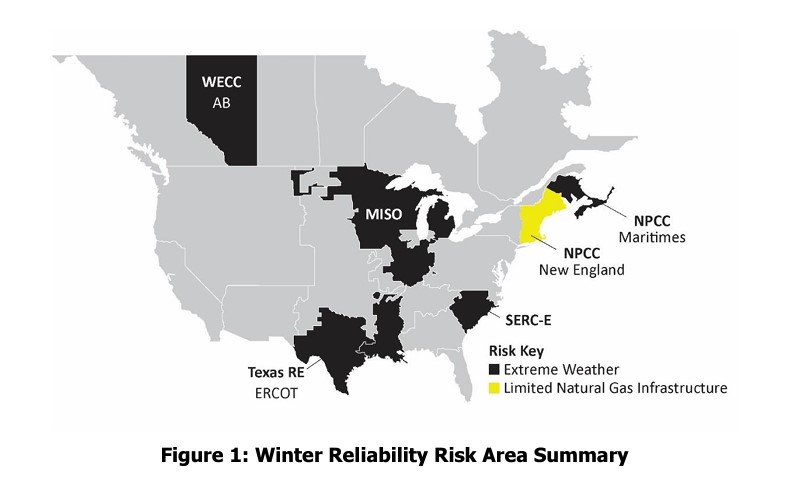North American Electric Reliability Corporation: Extreme weather in the Midwest could cause blackouts this winter
On November 17, 2022, the North American Electric Reliability Corporation (NERC) issued its 2022-2023 Winter Reliability Assessment, a document that identifies risks to the electric grid for all of North America. The results were decidedly mixed for Minnesota and the 15-state regional electric grid to which it belongs, the Midcontinent Independent Systems Operator (MISO).
NERC concluded MISO would likely have enough power plants online to keep the lights on this winter during normal circumstances, but it warned that if we experience extreme weather, like a Polar Vortex, we could face the prospects of “energy shortages requiring system operators to take emergency operating actions, up to and including firm load shedding,” which is a technical way of saying rolling blackouts.
The report emphasized that load shedding is unlikely but may be needed under wide-area cold weather events.

The report stated that MISO’s reserve margin, which is the margin of safety on the electric grid, had fallen by five percent since last winter due to the closure of 4,200 megawatts (MW) of nuclear and coal-fired generation. These retirements were not offset by natural gas additions, making the grid more vulnerable to shortages in the event of extreme winter weather.
Sonal Patel of Power Magazine asked John Moura, NERC’s director of Reliability Assessment and Performance Analysis if this year’s report presented a higher risk outlook compared to last winter.
Moura responded, “Year after year, there’s been a lot of factors that have pushed the system in a tighter condition,” he said. “What we find is a progression of risk over the last several years—really unlike what we’ve seen in the past—so this is a bit unprecedented,” he said.
Moura continued:
“The trend is we’ve seen more areas more at risk,” he added. “We see more retirements of critical generation, fuel challenges, and we’re doing everything we can to make sure in the operational phase these resources are in place to maintain reliability. And we’re giving the right situation awareness at the highest levels to ensure reliability even during our most extreme conditions.”
Given the elevated risks during extreme weather events, NERC issued recommendations to help stem the growing grid reliability problem. One of these recommendations should stand out to state policymakers:
State and province policymakers have the authority and jurisdiction to implement actions that preserve critical generation resources. State and provincial regulators should consider energy risks for the upcoming winter season and take steps to delay imminent generation retirements if essential to reliability. Additionally, state regulators can assist grid operators in advance of and during extreme cold weather by supporting requested environmental and transportation waivers as well as public appeals for electric load and natural gas conservation.
Translated into layman’s terms, NERC is stating that more areas are at risk because utility companies are prematurely retiring their coal plants and are not replacing them with enough natural gas capacity to backfill the gaps for the sake of reliability.
State policymakers have the authority and jurisdiction to preserve these coal plants, which are “critical generation resources,” to help prevent the need for emergency actions to maintain grid reliability.
While NERC’s Winter Assessment covers the period from December until March, the reliability problems caused by retiring coal plants will not go away any time soon. MISO did not have enough power plant capacity to meet its reserve margin for the summer of 2022, and this trend will likely get worse in the future as companies like Xcel Energy prematurely shutter their coal plants.
The growing electricity reliability crisis is why American Experiment is leading the charge to save Unit 2 at Xcel’s Sherburne County (Sherco) Generating Station from the wrecking ball next year. We are in a reliability hole, and the first thing we need to do is stop digging.
Sign our petition to tell Xcel Energy and the Minnesota Public Utilities Commission to Save Our Sherco and help reduce the risk of rolling blackouts hitting our region.